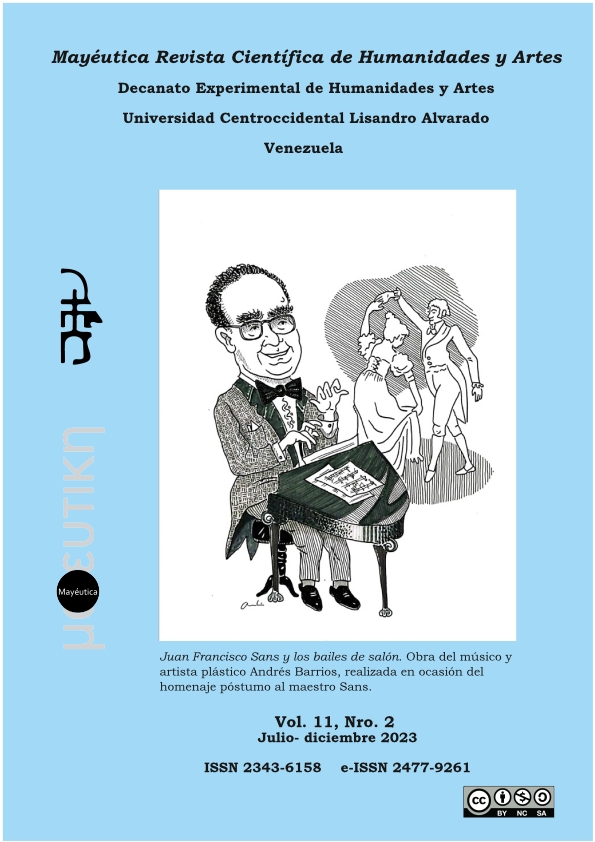Triangulation of methods in social sciences as a foundation for university research in Latin America
DOI:
https://doi.org/10.5281/zenodo.8140907Keywords:
higher education, research, triangulation of methods, creativity, proactivityAbstract
The university methodological praxis in Latin America shows a tendency towards collaborative and networked work. At the same time, there is also a research
culture of urgency, of immediacy in the answers, so it is important that the Latin American University assumes as a challenge the recreation of its capacity to adapt
to the contextual needs. This challenge entails a transformation in the missionary functions, including its research work; more specifically, in the application of
research methods that in an integrated and convergent way contribute to the understanding of reality. From this referent, the article is oriented to the
conception of a proposal for the triangulation of research methods, as a way for the production and validation of knowledge in social sciences. The methodological
approach is based on reflexive hermeneutics, by means of focus groups and in- depth interviews, which allow the conferring of meanings to the voices of the
actors (experts). The results allow to approach the understanding of triangulation as a theoretical construct, based on the contributions of different disciplines
(interdisciplinary perspective). It is concluded that there is a need to resize university research praxis in the field of social sciences, based on the relevance of
methodological triangulation as a process associated with knowledge.
Downloads
References
Arias, M.M. (2000). La triangulación metodológica: sus principios, alcances y limitaciones. Investigación y Educación en Enfermería, 18 (1), 13-26.
Braden, G. (2015). La matriz divina. Hay House.
Carvajal, B. & Melgarejo, I. (2014). Métodos Creativos: uso de la teoría de las inteligencias múltiples en la praxis investigativa. Revista Latinoamericana de Multiciencias (RLM) de la Universidad Politécnica de Guanajuato (UPG), 1 (1), 77-90.
Carvajal, B. (2016). Trabajo colaborativo en redes universitarias internacionales. Ágora de Heterodoxias, 2 (1), 13-18.
https://revistas.uclave.org/index.php/agora/article/view/220
Carvajal, B. (2019). Futuribles en la universidad pública venezolana 2030. Una aproximación prospectiva. Trama. Tecnológico de Costa Rica, Cartago, 8 (2), 118-144.
ChivaBartoll, O., Moliner, M., & SalvadorGarcía, C. (2020). Can servicelearning promote social wellbeing in primary education students? A mixed method approach. Vol.111. https://doi.org/10.1016/j.childyouth.2020.104841
Cisterna, F. (2005). Categorización y triangulación como procesos de validación del conocimiento en investigación cualitativa. Theoria, 14 (1), 61-71.
Cohen, L. & Manion, L. (1990). Métodos de investigación educativa. La Muralla.
Denzil, N. (1989). Strategies of Multiple Triangulation. The Research Act: A theoretical Introduction of Sociological Methods.
Donolo, D.S. (2009). Triangulación: procedimiento incorporado a nuevas metodologías de investigación. Revista Digital Universitària, 10 (8), 53.
Feuer, M., Towne, L. & Shavelson, R.J. (2002). Scientific culture and educational research. Educational Researcher, 31 (8), 4-14.
Flick, U. (2007). Introducción a la investigación cualitativa. 2a ed. Morata.
Galván, J. (2006). Aprendizaje integral en la práctica. El siguiente paso en la metodología que está transformando la enseñanza.
Heidegger, M. (1974). El ser, el tiempo. Fondo de Cultura Económica.
MarínGonzález, F., Cabas, L. De J. Cabas, L. C., & ParedesChacin, A. J. (2018). Formación Integral en Profesionales de la Ingeniería. Análisis en el Plano de la Calidad Educativa. Form. Univ. [online], 11 (1), 13-24.
https://dx.doi.org/10.4067/S071850062018000100013
Martínez, M. (2004). Ciencia y Arte en la Metodología Cualitativa. Trillas.
Martínez, M. (2009). Nuevos Paradigmas en la investigación. Alfa.
Martínez, J.S. & Merino, R. (2011). Formación profesional y desigualdad de oportunidades educativas por clase social y género. Revista Tempora, La Laguna, (14), 13-37.
Mendivel, I., Carhuancho I., Nolazco, F., Flores, D., & Venturo, C. (2020). Analysis Of Research Culture and Scientific Production in a National University. International Journal of Scientific & Technology Research, 9 (2), 705-709.
Moreno, A. (1995). El aro y la trama. Episteme, modernidad y pueblo. Centro de Investigaciones populares.
Moreno, A.; Luna, P.; Brandt, J.C.; Campos, A.; Navarro, R.; Pérez, M.; Rodríguez, W. & Varela, Y. (2002). Buscando padre, La historia de vida de Pedro Luis Luna. Universidad de CaraboboCentro de Investigaciones Populares.
Moreno, A. (2006). La Investigación convivida. La experiencia vivida como horizonte epistemológicopráxico en la investigación en Ciencias Sociales. Heterotopia, 11, (34), 9-26.
Okuda, M. & Gómez, C. (2005). Métodos en investigación cualitativa: Triangulación. Revista colombiana de psiquiatría, 34 (1), 118-124.
Oppermann, M. (2000). Triangulation A Methodological discussion. International Journal of Tourism Research, 2 (2), 141-146.
Paul, J. (1996). Between Method Triangulation. The International Journal of Organizational Analysis, 4 (2), 135-153.
Rodríguez, C., Pozo, T., Gutiérrez, J. (2006). La triangulación analítica como recurso para la validación de estudios de encuesta recurrentes e investigaciones de réplica en Educación Superior. Relieve, 12 (2), 289-305.
Ruiz, J.I. (2012). Metodología de la investigación cualitativa. 5a ed. Universidad de Deusto.
Sandín, M.P. (2006). Investigación cualitativa en educación. McGrawHill.
Santos, K., Ribeiro, M., Ulisses, D., Pereira, I., & Soares, S. (2020). The use of multiple triangulations as a validation strategy in a qualitative study. Ciênc. saúde coletiva [online] 25 (2) 655-664.
https://doi.org/10.1590/141381232020252.12302018
Stokols, D., Fuqua, J., Gress, J., Harvey, R., Phillips, K., BaezcondeGarbanati, L., … Trochim, W. (2003). Evaluating transdisciplinary science. Nicotine and Tobacco Research, 5 (SUPPL. 1), S21-S39.
https://doi.org/10.1080/14622200310001625555
Wang, J., Aenis, T., & Siew, T.F. (2019). Communication processes in intercultural transdisciplinary research: framework from a group perspective. Sustainability Science, 14, 1673–1684. https://doi.org/10.1007/s11625019006614
Zamora, R. & Hernández, F. (2014). La triangulación interdisciplinar como propuesta metodológica para el estudio de la imagen pública de las universidades. Sphera Publica, 1 (14), 39-69.
Published
How to Cite
Issue
Section

This work is licensed under a Creative Commons Attribution-NonCommercial-ShareAlike 4.0 International License.





